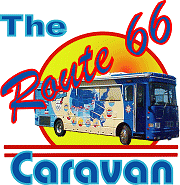 |
America's Biggest Road Trip! |
Route 66
Caravan Road Log:
|
 |
America's Biggest Road Trip! |
Route 66
Caravan Road Log:
|
"If You haven't stopped at the Jack Rabbit, you haven't been in the Southwest." |
| In the old days of Route 66 travelers would see billboards advertising the Jack Rabbit Trading Post in Arizona for hundreds of miles in either direction. Can you imagine how many parents were badgered into stopping because of those signs? I imagine many a weary mom or dad breathed a sigh of relief when they spied the "Here it is" Jack Rabbit sign. The family vacation wouldn't have been complete without slugging down some of the Jack Rabbit's sweet cherry cider and perusing the many fascinating items that were for sale ~ at least as far as the kids thought! | ||||
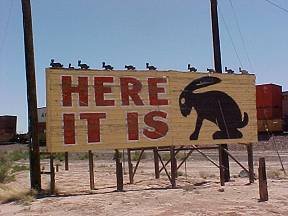 |
The famous Jack Rabbit sign. This is the original sign, repainted numerous times of course, that was put up in the 1940s and may well be the oldest or at least one of the oldest original Route 66 signs! |
|||
| The Jack Rabbit Trading Post was built after W.W. II by James H. Taylor. James realized that America was on the move and Route 66 was going to be busy with tourists heading out to the Grand Canyon or California beyond and back. He chose a location and a marketing scheme and the Jack Rabbit has been going strong ever since. It has become a Route 66 Icon. | ||||
Jim Conkle attempts to tame the spirited Jack Rabbit. The Rabbit won by the way.This is a new Jack Rabbit, the original one just plain wore out over the years. |
|
|||
|
The Jack Rabbit is owned by Tony and Cindy Jaquez today and they still carry on the fine traditions of yesteryear. Drop by and say hi on your next Route 66 Journey. |
|||
|
|
|||
There are many one-of-a-kind Jack Rabbit souvenirs to be found inside! |
||||
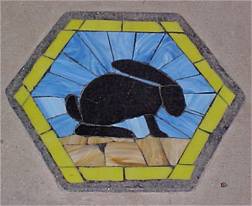 |
||||
You can find the Wild West in Holbrook! |
||||
| The year was 1882, and the new railroad town of Holbrook was to become a hell-raising Babylon on the Little Colorado. Saloons with names like Bucket of Blood were common. Lawless and violent behavior was prevalent. One of the west's most celebrated gunfights took place here in 1887, a spin-off of the Pleasant Valley Range War. And President McKinley sent a reprimand to the sheriff of Holbrook in 1899 for sending out an ornate invitation to a public hanging. Holbrook became the county seat for Navajo County in 1895 and until 1914 it was said to be the only county seat in the U.S. that didn't have a church. The Aztec Land and Cattle Company, better known as the Hashknife Outfit, began operations in Holbrook in 1884 and became the second largest cattle ranch in the U.S. In fact Zane Grey wrote one of his stories "The Hashknife Outfit" based on these folks in 1929. | ||||
| Cowboys that rode for the Hashknife were as rough as they get. It was said that many of them were wanted men, or men that weren't wanted anywhere else. Twice, members of the Hashknife Outfit were linked to train robberies at Canyon Diablo (near present day Two Guns). |
|
|||
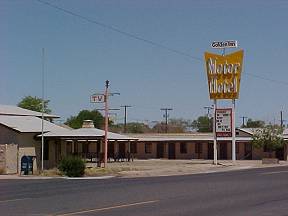 |
By the time Route 66 arrived, Holbrook had settled down somewhat. The days of the open range were over. Holbrook became an overnight mainstay on old Route 66 and tourism became a major industry for this wild west town. | |||
Remnants of old Route 66 can be found all along the highway in Holbrook. This town offers many photo opportunities! |
|
|||
| Trading Posts, old cafes and colorful motels still line Route 66 in Holbrook. One of the most interesting, and probably most photographed is the Wigwam Motel. Originally built in 1950, it has survived the demise of the Mother Road and proudly asks Have You Slept in a Wigwam Lately? | ||||
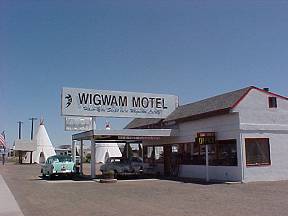 |
|
|||
 Previous Log |
Road Log pages read like a book:Follow the Route 66 Caravan
|
|
||||
|
||||||
66 Caravan Web Site Written, Photographed & Designed by Guy Randall |
||||||
© 2003 Design and Updates by ![]() GRandall Web Design
GRandall Web Design